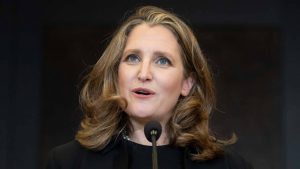Government extends CERB, announces new COVID-19 ‘recovery’ financial benefits

The federal government is extending the Canada emergency response benefit (CERB) by one more month and revamping the employment insurance program to allow more people to receive financial assistance during COVID-19.
The suite of benefit reforms, aimed at helping Canadians through the transition as the economy gradually reopens, is expected to cost $37 billion.
Measures include greater flexibility on the work hours required for EI, making it easier for people to qualify for a one-year period.
Deputy Prime Minister and Finance Minister Chrystia Freeland and Employment Minister Carla Qualtrough are announcing the new measures during a news conference in Ottawa and cbcnews.ca is carrying it live.
CERB, which has already paid out more than $69 billion to more than 8.6 million recipients, will now be in place until Sept. 27, extending the program from six months to 28 weeks.
CERB pays people $2,000 a month.
Canadians who were already eligible for EI will transition to that program when CERB winds down, while those who don’t qualify can apply for new “recovery” benefits.
Self-employed or gig workers, for example, can apply for a benefit of up to $400 a week for up to 26 weeks if they have stopped working or had reduced incomes due to COVID-19.
Under the new regime, they can continue to earn money, but will be required to repay 50 cents of every dollar earned above $38,000.
Sick leave benefit
A second new benefit will provide 10 days of paid sick leave to any worker in Canada who falls ill or has to self-isolate due to COVID-19. That will provide $500 a week, and a claimant can’t claim this benefit and another sick leave payment at the same time.
That program was negotiated with the provinces and territories under an agreement to restart the national economy safely.
A third benefit will support Canadians who must stay home to care for a child under 12 or another dependent because their school, daycare or other day program facility is shut down due to COVID. People who choose to keep their kids home even though the facility is open will not qualify, unless they provide proof there is a medical reason to do so such as an immunodeficiency disorder.
The three new recovery benefits, which will be taxed at payment, are expected to cost $22 billion. The extension of CERB another $8 billion and added EI costs are pegged at $7 billion, for a total of $37 billion.
Applications for the new recovery benefits will open in October, with payments flowing in three to five days.
The recovery benefits require parliamentary approval.
Parliament is currently prorogued until Sept. 23, when the House of Commons will begin a new session with a speech from the throne crafted by the Liberal government.
Prime Minister Justin Trudeau has said the suspension of Parliament was to allow the government to focus on its post-pandemic economic recovery plan. Because the mandate has changed significantly since last fall’s election, Trudeau said it was also important to get a vote of confidence on the government’s agenda from the House of Commons.
CBC








Redes Sociais - Comentários